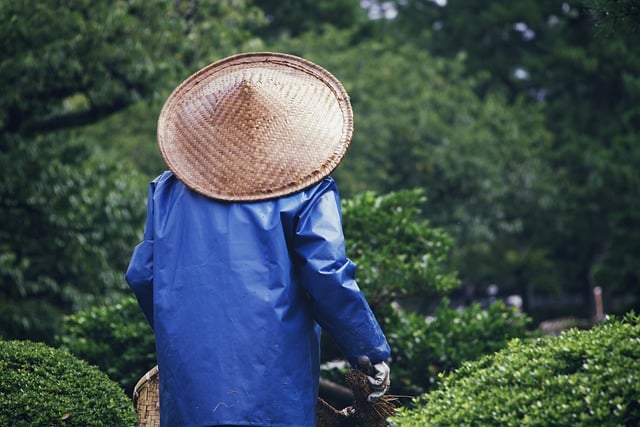Yard waste removal and recycling through professional branch chipping services are pivotal for maintaining a healthy landscape by enhancing tree and shrub health, promoting soil fertility, and supporting sustainable practices. Regular chipping of organic matter not only prevents the accumulation of debris that can harbor pests and diseases but also transforms it into nutrient-rich mulch or compost that benefits plant growth and soil quality. This process aids in weed suppression, moisture conservation, and provides insulation for root systems. It's an environmentally friendly approach to yard maintenance as it reduces waste and encourages sustainable living by repurposing organic material. Homeowners can align with these eco-conscious practices by incorporating routine branch chipping into their garden upkeep, ensuring a cleaner, healthier yard while contributing to ecological balance.
Furthermore, communities have established specialized programs for yard waste removal and recycling to manage organic materials from gardens and divert them from landfills. These initiatives are designed to compost and enrich the soil, providing an alternative to chemical fertilizers and promoting biodiversity conservation. Homeowners can participate in these services by following designated collection schedules, which not only simplify garden maintenance but also support a circular economy and environmental stewardship.
Professional pruning services also play a significant role in landscape health by offering expert care to shape trees and shrubs for optimal growth and visual appeal while ensuring against over-pruning. The sustainable management of yard waste by transforming trimmed branches into mulch or compost further emphasizes the importance of these services in eco-friendly landscape maintenance. Investing in such professional services is a commitment not only to the aesthetics of one's property but also to its long-term health and ecological responsibility, making yard waste removal and recycling a cornerstone of sustainable yard upkeep.
Branch chipping and pruning are vital practices for maintaining a thriving landscape. This article delves into the significance of regular branch chipping in promoting plant health, offering insights into efficient techniques that homeowners can employ. Furthermore, it explores local yard waste removal and recycling programs as eco-friendly options for disposal. Additionally, the benefits of professional pruning services are highlighted, emphasizing their contribution to sustainable yard maintenance. Read on to understand how these practices not only enhance the aesthetics of your outdoor space but also support environmental health through Yard Waste Removal and Recycling initiatives.
- Understanding the Importance of Regular Branch Chipping for Healthy Landscapes
- Efficient Branch Chipping Techniques: Tools and Methods for Homeowners
- Exploring Local Yard Waste Removal and Recycling Programs
- Benefits of Professional Pruning Services and Their Role in Sustainable Yard Maintenance
Understanding the Importance of Regular Branch Chipping for Healthy Landscapes

Regular branch chipping is a pivotal aspect of maintaining a thriving landscape, ensuring the health and longevity of trees and shrubs. As vegetation grows, it naturally sheds branches, leaves, and other organic matter. This yard waste not only accumulates but also serves as a potential breeding ground for pests and diseases if left unmanaged. By utilizing professional branch chipping services, homeowners and landscapers can expedite the decomposition process, transforming this waste into valuable mulch or compost. This process enhances soil quality and aids in plant growth, creating a more vibrant landscape. Moreover, these services contribute significantly to yard waste removal and recycling efforts. By repurposing organic material, these services minimize the environmental impact of yard waste and promote sustainable practices. The resulting chippings can be used to enrich garden beds, suppress weeds, conserve moisture, and insulate plant roots from extreme temperatures. Homeowners who prioritize regular branch chipping and pruning not only bolster their landscape’s health but also align with eco-friendly waste management solutions. It is a proactive approach that supports the overall ecosystem of the yard while fostering an environment where plants can flourish without the constraints imposed by excessive organic debris.
Efficient Branch Chipping Techniques: Tools and Methods for Homeowners

Maintaining a healthy garden or landscape requires regular upkeep, including branch chipping and pruning. Efficient branch chipping is a critical task for yard waste removal and recycling. Homeowners can employ various tools and methods to ensure that this process is both effective and environmentally friendly. Electric or gas-powered chippers are commonly used for breaking down branches into finer pieces, which can then be utilized as mulch or compost. These devices are designed to handle a wide range of branch sizes, making them versatile for different garden needs. When using a chipper, it’s crucial to feed the branches consistently and at the correct angle to prevent clogs and ensure the chips come out finely processed. Additionally, safety gear such as gloves, eye protection, and ear muffs should be worn to safeguard against accidents or injury.
The method of chipping not only aids in yard waste removal but also contributes to the recycling of organic matter back into the garden. This process not only clears space in the yard but also provides beneficial nutrients for the soil. For homeowners, understanding the proper technique is key to maximizing the efficiency and sustainability of branch chipping. It’s recommended to chip branches when they are dry, as this reduces the risk of the machine getting jammed with wet sap or wood. Furthermore, keeping the chipping area clean and free of debris ensures smoother operation and longevity of the equipment. Yard waste removal and recycling through branch chipping is a rewarding practice that supports a healthy garden ecosystem and promotes eco-friendly waste management.
Exploring Local Yard Waste Removal and Recycling Programs

Many communities offer specialized yard waste removal and recycling programs tailored to handle the organic debris generated by routine pruning and branch chipping activities. These local initiatives are designed to facilitate the proper disposal of yard waste, ensuring that it does not contribute to landfill waste. Homeowners can often set out yard waste for collection on designated days, where it is then composted or recycled into nutrient-rich soil amendments. These programs not only support sustainable practices but also provide residents with access to high-quality compost, which can be used to enrich gardens and reduce the need for chemical fertilizers. Additionally, by participating in these services, communities can mitigate the environmental impact of yard maintenance activities, contributing to a healthier ecosystem and promoting biodiversity.
Residents interested in such services should consult their local waste management authorities to understand the specific guidelines and schedules for yard waste collection. These programs often accept a variety of organic materials including leaves, grass clippings, branches, and wood chips. By engaging with these local yard waste removal and recycling initiatives, homeowners can play an active role in fostering environmental stewardship and supporting the circular economy, all while keeping their yards clean and well-maintained through regular pruning and branch chipping services.
Benefits of Professional Pruning Services and Their Role in Sustainable Yard Maintenance

Maintaining a healthy landscape is a multifaceted task that involves regular pruning, and this is where professional pruning services excel, offering numerous benefits for your yard’s vitality. Unlike DIY attempts, professionals adeptly shape trees and shrubs to promote growth, enhance aesthetic appeal, and encourage plant resilience. Their expertise ensures that only the necessary branches are removed, preventing over-pruning which can stunt a plant’s development. Moreover, these services prioritize yard waste removal and recycling, a critical aspect of sustainable maintenance practices. By transforming trimmings into mulch or compost, they not only reduce landfill waste but also return nutrients to the soil, supporting its health and the overall ecosystem. This thoughtful approach to yard waste management aligns with eco-friendly landscape upkeep, making professional pruning a cornerstone of sustainable yard maintenance.
Choosing professional pruning services extends beyond mere aesthetics; it’s a proactive investment in your landscape’s long-term health and safety. Professionals are well-versed in the specific pruning requirements for various plant species, ensuring optimal growth patterns and preventing disease transmission between plants. Their commitment to yard waste removal and recycling further underscores their dedication to sustainable practices. By properly disposing of pruned materials, they help mitigate the environmental impact of yard maintenance, contributing to a greener and more sustainable environment. With their knowledge and eco-conscious methods, professional pruning services are indispensable for maintaining a thriving yard while adhering to environmental stewardship principles.
Effective yard waste removal and recycling are pivotal in maintaining healthy, thriving landscapes. Regular branch chipping and pruning not only enhance garden aesthetics but also contribute to the overall ecological balance. Homeowners can employ efficient techniques for branch chipping, ensuring timely clean-ups. Professional pruning services further these efforts, offering expertise that supports sustainable yard maintenance practices. By utilizing local yard waste removal and recycling programs, residents play a vital role in promoting environmental stewardship and community health. This holistic approach underscores the importance of responsible yard management as a key element in preserving our environment for future generations.
